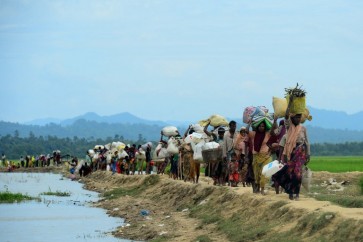Popular Reads
Top Results
Can't find what you're looking for?
View all search resultsPopular Reads
Top Results
Can't find what you're looking for?
View all search resultsThis General Assembly, ASEAN should show true leadership on Rohingya
ASEAN has been one of the few actors able to engage the Myanmar government since 2017. The region’s leaders must show compassion for the Rohingya and push Myanmar to take steps to end the violence, discrimination, and persecution that forced out the Rohingya. Otherwise, this tragedy will continue.
Change text size
Gift Premium Articles
to Anyone
 In this file photo taken on October 19, 2017 Rohingya refugees who were stranded walk near the no man's land area between Bangladesh and Myanmar in the Palongkhali area next to Ukhia. Hundreds of desperate Rohingya Muslims still pour over the Myanmar border into Bangladesh camps every week, six months into the refugee crisis. (AFP/Munir Uz Zaman)
In this file photo taken on October 19, 2017 Rohingya refugees who were stranded walk near the no man's land area between Bangladesh and Myanmar in the Palongkhali area next to Ukhia. Hundreds of desperate Rohingya Muslims still pour over the Myanmar border into Bangladesh camps every week, six months into the refugee crisis. (AFP/Munir Uz Zaman)
T
wo years on, Asia is no closer to ending its worst refugee crisis in decades. Over 900,000 Rohingya are in Bangladesh alone, including 759,000 who fled a campaign of violence by the Myanmar military in Rakhine state that began in August 2017. Hundreds of thousands had already left, to Indonesia, Thailand and Malaysia, as well as in India and further afield. This is an Asian crisis, but Southeast Asia should show stronger leadership.
Southeast Asia’s leaders will come together on the sidelines of the ongoing United Nations General Assembly and during the ASEAN Summit in November. ASEAN has been one of the few actors able to engage the Myanmar government since 2017. The region’s leaders must show compassion for the Rohingya and push Myanmar to take steps to end the violence, discrimination, and persecution that forced out the Rohingya. Otherwise, this tragedy will continue.
As a medical humanitarian organization providing health care to Rohingya in Malaysia, Myanmar and Bangladesh, the Doctors without Borders (MSF) witnesses their daily struggles. In Bangladesh and Malaysia, the Rohingya do not have refugee status and need some form of temporary legal stay. In Myanmar, they are denied citizenship and treated as foreigners. Statelessness is the root of their vulnerability.
In Malaysia, MSF treats Rohingya patients badly injured in work accidents who are deterred from seeking medical care at public hospitals due to fear of being reported to immigration. Yet recent research demonstrates that including refugees in the legal workforce could add millions to gross domestic product and tax revenue, as well as create jobs for Malaysian citizens. The Pakatan Harapan manifesto promised legal status and work rights to refugees; the government should fulfill these commitments. Malaysia can lead by example on the question of status, by granting Rohingya some form of temporary status to stay in the country legally.
In Bangladesh, MSF teams see how the Rohingya languish in squalid camps, unable to build a future for themselves with formal education or work. Bangladeshis’ generosity is wearing thin and refugees face growing curtailment of rights. They are barred from independently accessing public health facilities due to movement restrictions, and there are a lack of specialized services for mental health and sexual and gender based violence. The only legal avenue to reach healthcare providers in Cox’s Bazar is through referrals by humanitarian actors, such as MSF.
Rohingya in Bangladesh and Malaysia tell MSF that they feel suspended in time, unable to move beyond daily survival simply because of their identity. They say that while they dream of returning home, they currently see no pathway to a better life there.
In Myanmar, since January an upsurge in fighting between the military and the Arakan Army, an ethnic Rakhine insurgent group, has displaced tens of thousands. This new wave of violence is affecting all communities. A curfew and restrictions on humanitarian aid have been imposed across central and northern Rakhine.

















